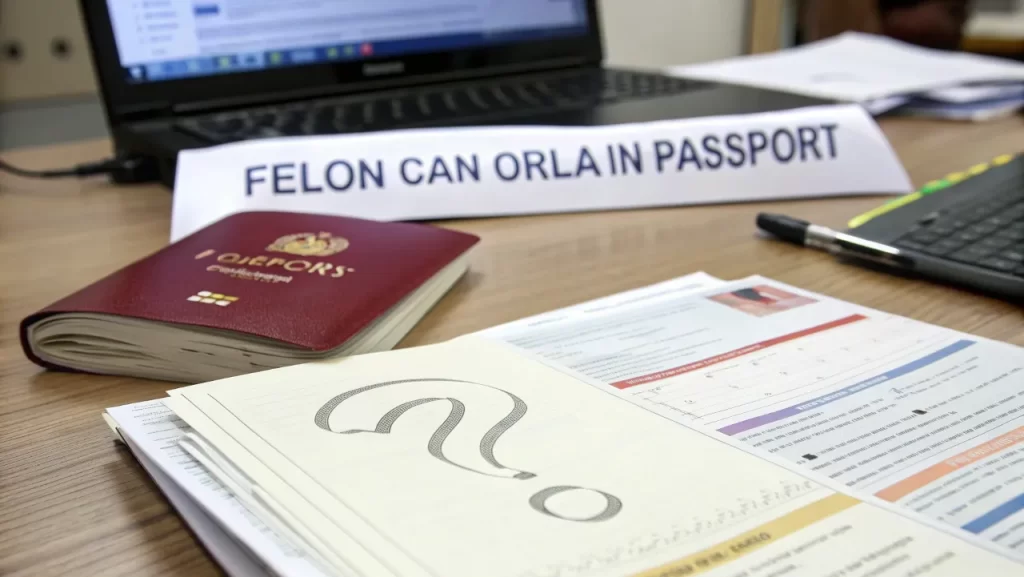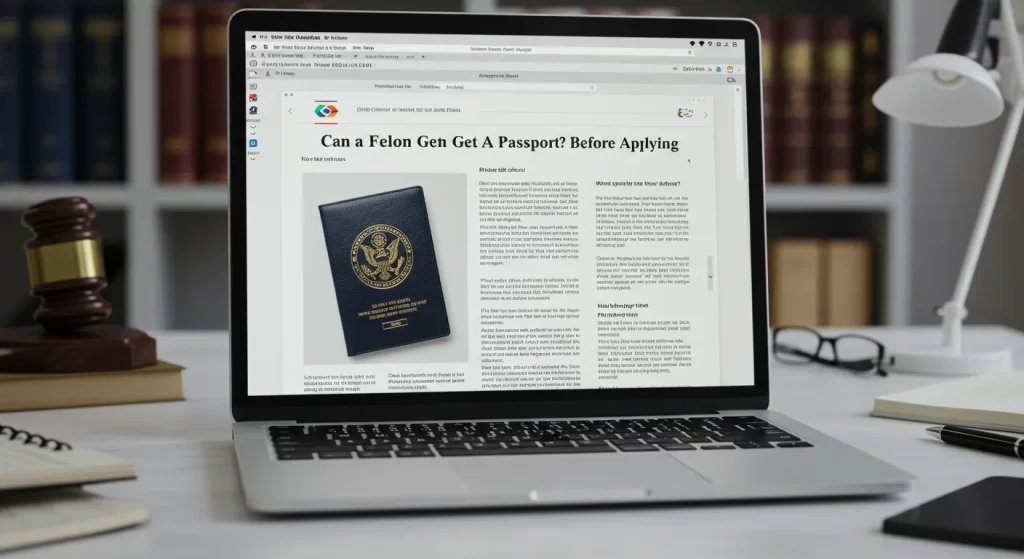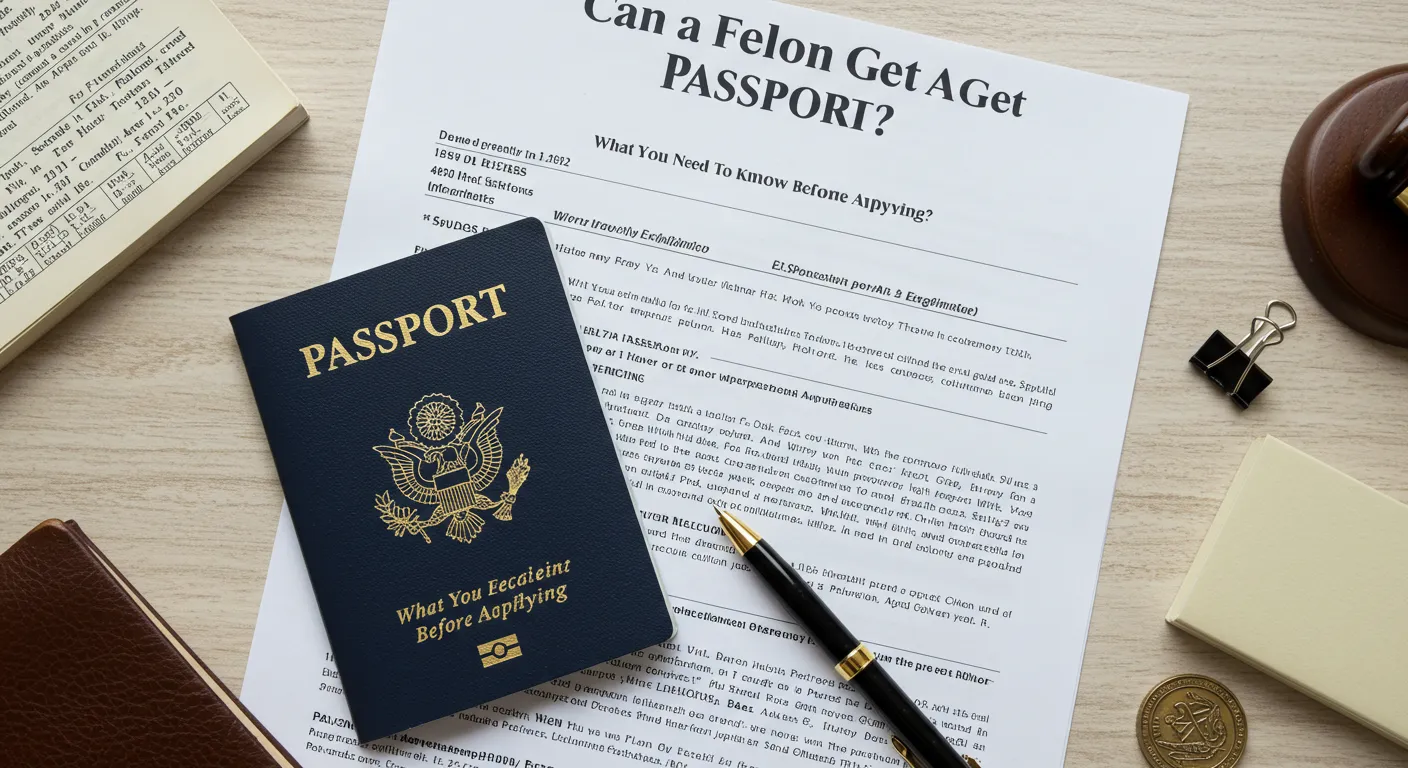Table of Contents
When you’ve served your time or are planning a new chapter in life, you might ask, “Can a felon get a passport?” This question is more common than you might think—and the answer is surprisingly hopeful for many.
While having a felony conviction can bring certain complications, it doesn’t always mean you’re barred from international travel. In fact, many felons can get a passport under specific conditions. However, several important factors may impact your ability to apply for or use one.
In this guide, we’ll explore the situations where you can (or can’t) get a passport with a felony record, what the process involves, and how to avoid setbacks during your application.
How Past Crimes Can Affect Travel Plans
Having a criminal record doesn’t automatically strip you of your right to a U.S. passport. However, the nature of your felony, current legal status, and any unresolved obligations can influence the outcome. Some crimes, especially those involving international drug trafficking or national security, may result in a direct denial.
For example, if you were convicted of drug crimes that crossed borders, your eligibility may be affected under federal laws. The U.S. government places a higher priority on restricting travel for individuals involved in activities that could present ongoing threats.
What Happens if You’re on Probation or Parole?

If you’re still serving a sentence—even if it’s outside of prison—you might face restrictions. Those on probation or parole must often get approval from their supervising officer before applying for or using a passport. The key issue here is permission to leave the country, which is typically limited while under supervision.
However, once you’ve completed probation or parole, your path becomes clearer. In most cases, all you need is proof—like a discharge letter or court order ending supervision—to include with your passport application. Click Here: wong’s genghis khan
Why Unpaid Obligations Can Hold You Back
It’s not just criminal history that can delay or deny a passport. The U.S. Department of State can block your application if you owe over $2,500 in child support or have outstanding federal loans, such as those related to repatriation. These financial obligations must be resolved before your application can move forward.
What’s more, these issues often catch applicants by surprise, especially if the debts aren’t recent. Checking your records and resolving any outstanding government-related debts before applying is a smart move.
Also Read: Which of the Following Statements Is True About Men’s Earrings In 2025?
National Security Concerns and Case-by-Case Denials
Beyond specific legal or financial blocks, the U.S. government also reserves the right to deny passports on discretionary grounds. If the Department of State believes that issuing a passport to someone may threaten national security or result in criminal behavior abroad, they can choose to reject the application—even without a direct link to a felony.
This typically applies to individuals involved in ongoing federal investigations or suspected of foreign criminal activity. Although rare, this clause is a reminder that every case is assessed individually.
Can You Apply While Facing Charges?
If you have pending felony charges, your ability to obtain a passport is often paused. Can a Felon Get a Passport or prosecutors may request a hold on your passport or even require you to surrender it until the case is resolved. That’s because passports represent mobility and potential flight risk.
Even if the charges aren’t serious, having an unresolved case will typically delay your application process until there’s a verdict or dismissal.
When the Court or Police Took Your Passport
Sometimes, law enforcement agencies or courts may confiscate a passport during a legal case. If the passport is still valid and you’ve resolved the matter, you can request its return. The Department of State allows individuals to get their passports back under specific conditions—but you’ll need to follow a formal process.
You’ll have to write a request letter and have your probation officer send a supporting statement or official documentation confirming your legal status has changed.
What to Do if Your Passport Is Expired or Lost

If your passport expired or was taken and later reported lost or stolen, the process changes. In that case, you must apply for a Can a Felon Get a Passport, not just request its return.
When applying for a new one, include proof that your probation or parole has ended. Acceptable documents include termination letters or court orders. As long as everything checks out and no other flags exist, you’ll likely be able to get your new passport just like any other citizen.
Don’t Forget to Check the Entry Rules of Your Destination
Even if you manage to Can a Felon Get a Passport, that doesn’t mean you can travel anywhere freely. Every country has its own entry rules for people with criminal records. For instance, Canada and Australia are known for their strict stance on admitting convicted felons, especially for violent or drug-related crimes.
So before booking your trip, always check the immigration policies of your intended destination. Some nations offer waivers or exceptions, but these often require separate applications and documentation.
Also Read: Exploring the Classroom 15X Concept: A Modern Approach to Teaching
Legal Advice Can Make a Huge Difference
If you’re unsure about your situation, speaking with a criminal defense lawyer or immigration attorney is worth it. These professionals can help clarify what steps you need to take and whether there are any existing travel restrictions tied to your record.
Legal advice is especially useful if you have a complicated history, multiple convictions, or don’t know the status of your court case or federal obligations.
Rebuilding After a Felony: Travel as a Fresh Start
Traveling abroad can be a powerful way to start fresh, reconnect with family, or explore business opportunities. For many people with a past conviction, a passport represents more than just a government document—it’s a symbol of a new chapter.
If you’ve served your sentence, cleared your debts, and followed the proper channels, there’s often no reason you can’t travel just like anyone else.
Can a Felon Get a Passport?
So, can a felon get a passport? Yes—most of the time. While some circumstances, like international drug crimes, active charges, or unpaid child support, can block your application, many individuals with past felonies successfully receive their passports once legal conditions are met. Knowing what to expect, gathering the right documents, and checking country-specific entry rules can help you navigate this process smoothly.
Whether you’re planning a vacation, reconnecting with loved ones, or seeking new opportunities abroad, your criminal record doesn’t always have to hold you back. If in doubt, don’t hesitate to reach out to a legal expert who can guide you through the steps—and help you reclaim your right to explore the world.
FAQs
Can I get a passport while on probation or parole?
Not usually. You need permission from your supervising officer. Once completed, you can apply with proof your probation or parole ended.
Will unpaid child support stop me from getting a passport?
Yes. If you owe over $2,500 in child support, your passport application will be denied until the debt is paid in full.
Can I travel anywhere if I have a felony but got a passport?
Not always. Some countries deny entry to felons. Check the entry rules of your destination before booking travel.

